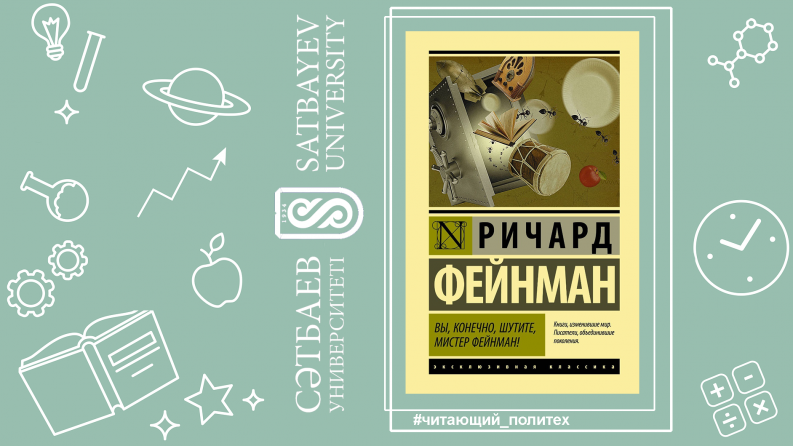The role of the individual in the history of the Great Steppe Civilization...
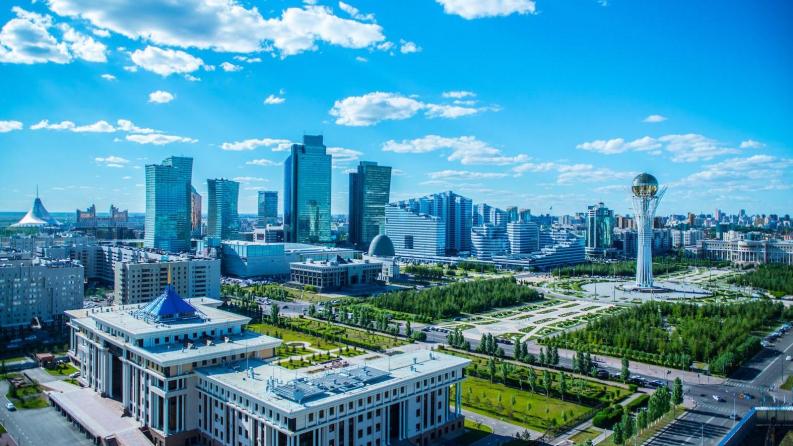
In the Humanities, there is a historical and philosophical concept of "the role of the individual in history", to which is devoted many major works in world historiography, such as R. Aron, S. Hook, G. Plekhanov, L. Grinin, A. Gushchin and etc. Indeed, there are many examples in history that were considered accidental by ordinary people, but in fact, are natural for historians. Despite the fact that history does not like subjunctive moods, historians and philosophers, sociologists, and anthropologists, have always wondered: How does an individual influence the development of historical events?
Without going into the theoretical depths of this issue, I will just note that this is not an idle question for Kazakhstan. It is dedicated to the article of our President Kassym-Jomart Tokayev "Lessons of historical personality" that describes the multifaceted activities of Elbassy-Nursultan Abishevich Nazarbayev in the development of our Homeland – the Republic of Kazakhstan – the glorious descendent of the Great Steppe Civilization.
There is a phase of historical development – the formation of a new system and order, which Kazakhstan faced after the collapse of the USSR. Living conditions are changing, society is being transformed on the social, economic, mental and psychological level, which requires a strong leader since it is precise during this period of the new order that the role of the individual is exceptional, who will lead the people and will be the guarantor of their rights and freedoms.
President K. K. Tokayev has written "As an experienced politician, Nursultan Nazarbayev was well aware that the Soviet power was on the verge of collapse. Therefore, during the critical period of history, he did not participate in the political games that unfolded in the former Union’s leadership, remaining as the supporter of integration processes. When a once-huge country collapsed, his position became decisive in the CIS formation." It is enough to recall that the CIS was created in Almaty, where the heads of former Soviet republics signed the "Alma-Ata Declaration" on December 21, 1991, that resulted in forming the Commonwealth of Independent States.
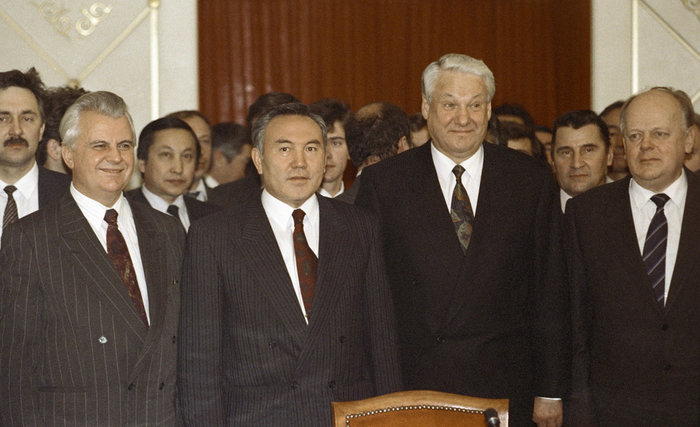
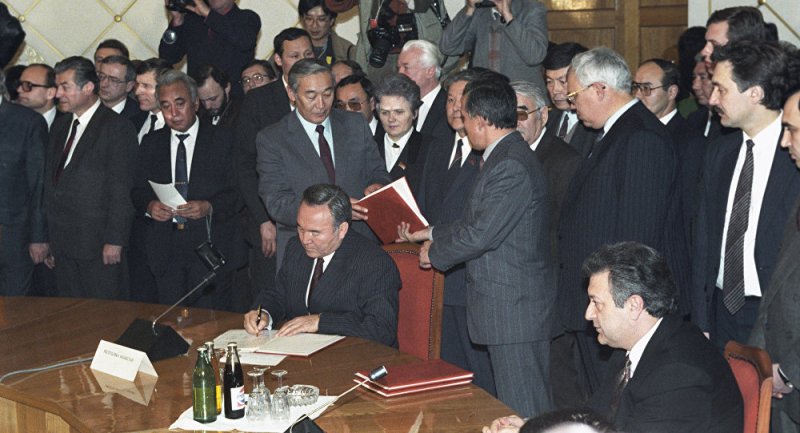
Until now, the Commonwealth of Independent States plays a huge role in Kazakhstan's foreign policy due to the deep mutual integration of the participating countries in all international relations spheres.
Kazakhstan became a bridge between Europe and Asia, developed the ideas of Eurasianism applicable to modern challenges, voiced in a new edition during N. A. Nazarbayev’s lecture to the faculty and students of Lomonossov Moscow State University in 1994.
On March 2, 1992, based on the results of the 46th session of the United Nations General Assembly, by resolution 46/224, the Republic of Kazakhstan was unanimously accepted as a UN member, thanks to the idea regarding the closure of the Semipalatinsk test site, peacekeeping activities in hot spots, and projects for the spread of the peaceful atom. On October 5, 1992, the first speech of the President of the Republic of Kazakhstan, Nursultan Nazarbayev, took place in the UN. It was then that he presented the UN with a symbol of our country – the Golden Man from the Issyk mound.
In New York, on September 25, 2019, the 74th session of the UN General Assembly was attended by the Kazakh delegation led by President Kassym-Jomart Tokayev, in the interview with whom it was said: "Of course, the event itself, as well as the General Assembly building, has its own unique atmosphere. A special pride for all Kazakhstanis is the fact that the UN headquarters has a symbol of our country- the Golden Man. There is a good tradition in the UN that all member states present the organization a memorable gift. Kazakhstan presented the UN with a copy of the Golden Man from the Issyk mound."
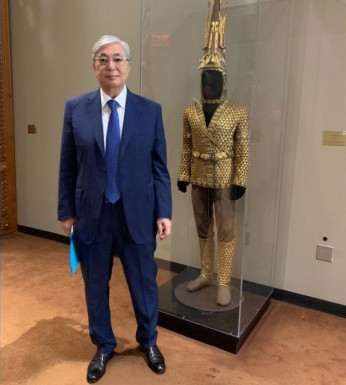
The fact that the UN building has a symbol of our country — the Golden Man — is an absolute pride and evidence of preserving Kazakhstan’s cultural heritage.
As a historian, I am concerned about the development of historical science in Kazakhstan, and it should be noted that a lot had been done for the given purpose, starting from the year of national history in 1998 until the publication of the work "In the flow of history" in 1999.
Further, the State programs “Cultural Heritage", “Mangilik El”, “Rukhani Zhangyru” and the proposed new seven-year program "Archive-2025" set out in the article of N. A. Nazarbayev "Seven edges of the Great Steppe" were successfully conducted and are being carried out as well. They are a consistent, well-thought-out and relevant strategy for scientific and patriotic development of the Republic of Kazakhstan.
The pandemic struck not only Kazakhstan, but also the whole world, radically changing our way of life, habits and human values of each of us. However, even in these conditions, we continue to work for our country’s well-being.
Therefore, at our Satbayev University, video lectures on the main professional and basic subjects were prepared in advance and introduced into the educational process, the Politechonline platform was elaborated, the given one allowed us to continue practical classes, take exams, etc. even in quarantine conditions.
The article highlights the prospects for the development of education and science in Kazakhstan even during the pandemic: "Conditions will be created for education and science development in Kazakhstan. It is necessary for the country’s future, for its economy prosperity. Eventually, Kazakhstan will have to significantly improve the quality of human capital."
The answers to everyday challenges are the activities of Satbayev University faculty whose achievements support the policy of our state in the development, modernization and intensification of education and science that is relevant in modern conditions. It is a high quality and highly professional human capital of the nation!
The Kazakh proverb says: "In fifty years the people and in a hundred years the whole world changes", but what is more important - in Kazakhstan there is a historical tradition of gratitude to the predecessors who laid the foundation for our present welfare, peaceful sky, inter-ethnic and inter-confessional harmony, tolerance and friendship.
Happy anniversary, Nursultan Abishevich, our Elbassy!
To paraphrase Winston Churchill, we can say: "In the changing world, a country must be led by a strong leader." Kazakhstan has strong and charismatic leaders, and everything will be fine, despite everything, this is the role of individuals in the history and development of the descendants of the Great Steppe Civilization...
Doctor of Historical Sciences, Professor G. M. MendikulovaProfessor of the Department of Social disciplines, Satbayev University
The photos were taken from open sources on the Internet








